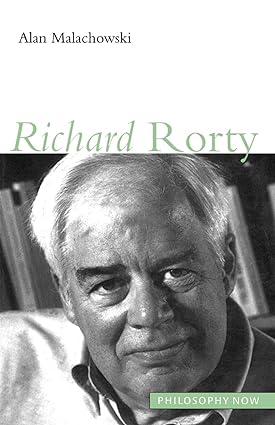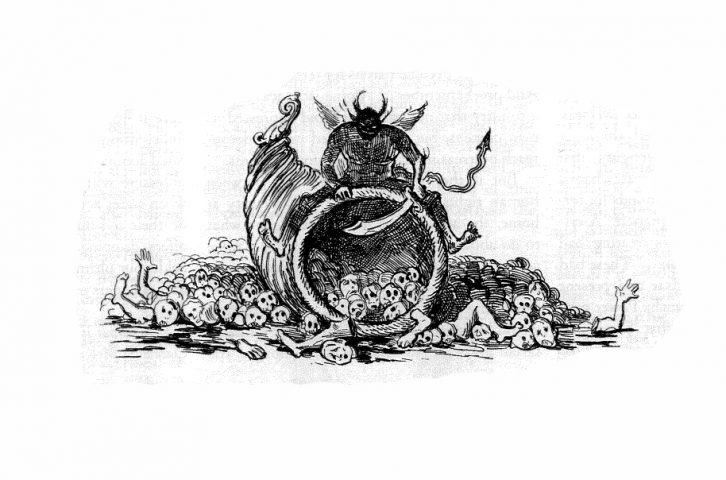Books Reviewed
Richard Rorty’s writing is full of those vices we Straussians (if you will permit me) love to hate—relativism, historicism, easygoing atheism, anti-philosophic rhetoric, vapid leftist political opinions, uncritical progressivism, and seemingly a general indifference to virtue. It’s true he claims to love America with the intensity of a redblooded chauvinist, but it’s not the America of the founding or of Abraham Lincoln. It’s the Hegelian-Whitmanesque America of the future, an America full of “moral narcissists” immersed in their private, idiosyncratic fantasies, who only find solidarity in their shared aversion to cruelty—a word that Rorty virtually identifies with acting on the thought that morality isn’t a private fantasy.
Nevertheless, in his book on Rorty for Princeton’s “Philosophy Now” series, Alan Malachowski shows that in many respects Rorty towers over his fellow professors of philosophy. Rorty has exposed to anyone with eyes to see the empty epistemological concerns of our analytic philosophers. As Malachowski observes, “Rorty displays endless patience and imagination in trying to ensure that pragmatism looks like the ‘natural successor’ to analytic philosophy, the remedy for all its deficiencies.” He has convinced me that Rorty’s pragmatism has already remedied some of these deficiencies.
Malachowski revels in his liberation from his analytic straitjacket, and he reports that he is not alone: “In point of fact, many more analytic philosophers are taking Rorty’s lead and actually reading thinkers like Heidegger, Foucault, and Derrida while at the same time retracing their historical steps to determine whether such key figures as Hegel and Nietzsche should have been marginalized.” These may be small steps, but they are real steps, toward once again taking the major figures in the history of philosophy seriously. They may also be slowly repeating what Rorty calls his “turning away from philosophy as a distinctive activity altogether, and towards the ordinary world—the problems of men and women, freshly seen by discarding the distinctions which the philosophic tradition had developed.” That turn reminds us, if only vaguely and incompletely, of an experience of Leo Strauss. On balance, Rorty seems to have improved professional philosophy in America by making it, as he says, “less pure,” as well as “sexier” and better written. Reading Rorty is a much greater pleasure than reading, say, John Rawls.
That’s not to say, of course, that Rorty accepts the Straussian injunction to try to understand the thinkers of the past as they understood themselves. Nor does he follow Heidegger in trying to think what they presupposed or left unthought. Pragmatically rejecting the distinction between truth and utility, Rorty characteristically caricatures the thought of others in order to further his own agenda. He writes of his “antagonism toward Platonism,” which is quite different from an antagonism toward Plato. Platonism is the dualistic effect Plato’s thought had on “the history of Western philosophy,” and not what the “genius” who wrote dialogues actually thought. Rorty tries to turn Platonism from a pernicious into a useful distortion.
He treats his favorite anti-Platonists, John Dewey and Martin Heidegger, in much the same way. He, in effect, has those two anti-dualistic and anti-metaphysical thinkers educate each other. His Heidegger teaches Dewey that his faith in the scientific method cannot be sustained if science, like everything else human, is a contingent historical product. Rorty’s Heidegger, in turn, learns from Dewey’s many and varied analyses of human experience, none confronting the experience of one’s own death. His Heidegger describes the temporal and contingent character of human existence without being bothered by the abyss. Actually, Rorty attempts to save Heidegger from a contradiction: The German seems to have proved that philosophy is no longer possible, but he insists we must still philosophize, because thinking is what distinctively human beings do. Rorty contends that Heidegger’s deepest worries were unfounded. Philosophy, in fact, has more or less disappeared, but the West and its distinctive kind of human being live on.
* * *
Roughly speaking, Rorty marries American pragmatism with European existentialism, and the union is at the expense of what is the source of truth and moral seriousness—science and death, respectively—in each one. Rorty can affirm the technological Americanization of the world—the use of scientific knowledge to make us free and comfortable—while rejecting the “truth” of scientific claims for knowledge that would make us uncomfortable. We can have the benefits without the burdens of modern anti-Platonism or atheism. Our hopes can no longer have anything to do with theological, scientific, or philosophical truth. But we can still hope for a better world. The truth about nature or Being is not really at the foundation of the conquest of scarcity by the market economy, modern medicine’s alleviation of human suffering, the compassionate institutions of the welfare state, or our decision to stop cruelly persecuting gays.
Rorty, Malachowski observes, “has a consistent flair, bordering on genius, for appropriating the work of other philosophers.” He is very good at using them to further his agenda, which is to continue the Enlightenment project of reducing human cruelty and suffering. Rorty says his critics are wrong to portray him as “a mindless and stupid cultural relativist,” and he often writes against the stupidity of multiculturalism. For him, the “cultural” or spiritual objections to the success of bourgeois liberal democracies in the modern West have no weight. Rorty’s apparent relativism really opposes the inhuman pretension that there’s some universal—divine or rational—perspective from which we can look down on the real achievements of particular human beings in a particular time or place. We intellectuals need to curb our pride and our tyrannical impulses through an ironic awareness about how contingent—or historically conditioned, but still idiosyncratic—our “esoteric” claims for superiority are.
To aim higher than the amelioration of misery is cruelly to use the rhetoric of religion or philosophy, in order to impose one’s power-driven fantasy on others. To aim lower is to be inhumanly insensitive (actually, Rorty suspects that other animals may share this sensitivity) to what we can feel for others even before we can speak. We should use language to arouse and expand this feeling or sentiment and diminish the tyranny that comes with rational, public claims for truth and virtue. Our goal as writers should be to say what we can to make a free and comfortable bourgeois life available to as many human beings (and eventually as many primates) as possible, to contribute to the general trend of modern, sentiment-driven progress. Rorty spends much of his rhetorical energy unmasking the anti-bourgeois ire, Left and Right, as merely ire.
A shortcoming of Malachowski’s fine book is that he hasn’t noticed Rorty’s increasing attention to Strauss and to Straussians such as Allan Bloom, Francis Fukuyama, and James Ceaser. Another piece of evidence for Rorty’s liberation from the constraints of professional philosophy—a liberation Malachowski doesn’t quite share yet—is that he thinks the Straussians are formidable enough to be ironized, to be joshed into not taking their devotion so seriously. So allow me to consider whether we Straussians might learn something from Rorty about how to lighten up.
The Straussians, according to Rorty, have “the hope of creating a society whose hero is Socrates,” and their efforts will save “what Heidegger calls ‘Western metaphysics.'” The Straussians fear as much as Heidegger did the coming of “the end of history,” which would be “the beginning of a nihilistic wasteland in which bourgeois freedom and bourgeois happiness may become universal but there are no appreciative readers of Plato.” For the Straussians—as for Nietzsche, Heidegger, Alexandre Kojève, Strauss, Theodor Adorno, and so forth—bourgeois culture “is the contemporary counterpart of the culture that put Socrates to death.” It is the culture of “Nietzsche’s ‘last men.'” Rorty says that we intellectuals now have to ask whether “we are more interested in alleviating misery or creating a world fit for Socrates, and thus for ourselves.”
* * *
A Straussian objection to the last man’s life of contented immersion in idiosyncratic fantasies—the mindless relativism criticized by Bloom—is that Socrates (or Bloom) would be miserable in that world. Socrates’ “dialectical method” depends on a world in which most people are somewhat miserable and somewhat moralistic. Straussians do sometimes say that misery and cruel morality are goods because they are preconditions for philosophy, a form of pleasure or happiness that most people will never enjoy. That is, they sometimes tend to agree with Rorty that moral virtue and religious belief are not goods in themselves.
Rorty notices that some Straussians do call for a reestablishment of philosophy’s authority over liberalism through a vindication of Socrates’ way of life, above all others. But some Straussians also share Rorty’s suspicion that there’s something tyrannical or at least unrealistic about making the role model for us all an irresponsible man who seems to confuse leisure and work, is a very questionable and sometimes perfunctory citizen, makes fun of religion, and finds little to no fulfillment in family life. Does Socrates provide sufficient guidance for us parents, friends, lovers, citizens, creatures, workers, and needy individuals? Does his conception of the self or soul really comprehend our dignity as beings compelled to live morally demanding lives at least somewhat in light of the truth? Rorty is not completely wrong to be ironic about the claim that Socrates is the cure for what ails us.
The Straussians, Rorty says, go even further: “They tend to agree with Kojève that if we give up on ‘the Platonic-Hegelian ideal of the Wise Man,’ if we deny ‘the supreme value that is contained in Self-Consciousness,’ then ‘we take away the meaning of all discourse whatsoever.'” Rorty identifies the point on which Strauss and Kojève agree, but he misleads us by not distinguishing between the Straussian and Hegelian (or historical) views of self-consciousness. And does Rorty understand Kojève’s irony? The result of that ideal of wisdom being achieved historically, according to Kojève, is the disappearance of human self-consciousness altogether, a development that Kojève would not lament. He claims that humans are historical beings—contingent and temporary cosmic accidents. Once we see that we, as historical or temporary beings, are defined by death and nothing more, then we are ready to die or disappear as self-conscious beings.
So Rorty and Kojève actually agree: Once we see that everything human is defined by time and chance, we are ready to become nothing more than clever animals. Rorty’s polemic against self-consciousness is from the perspective of a wise man who can see through human illusions about God, nature, morality, philosophy, and even history. The real desperation implicit in his strategy here might move us Straussians—who see the dogmatism in what passes for Kojève’s historical wisdom—to tell Rorty to lighten up.
He shares the historicist illusion of Nietzsche and Kojève—and, to tell the truth, of some Straussians—that the “last man” is possible. But some of us Straussians see that we have every reason to believe that human nature will triumph, as it has triumphed, over every human effort to eradicate it. We can’t really fight or talk or even drug and genetically manipulate the cruelties and miseries (as well as the joys and greatness) of human self-consciousness away. So we can’t help being moved strongly and deeply by love and death.
Rorty’s rhetoric or linguistic therapy, in truth, actually makes us more miserable, because it deprives us of the words that correspond to all our experiences without really making the uncomfortable ones go away. Today, bourgeois Americans mouth something like Rorty’s platitudes while being more death-obsessed than human beings have ever been. They’re obsessed with their bodies because they believe they don’t have souls. Their physical comfort and personal freedom are little compensation for the difficulty they have articulating and pursuing the goods that really constitute human life. They try but fail to replace truth with comfort, and so they remain restless and anxious in the midst of their pleasures. We bourgeois Americans are not really much like Nietzsche’s last men at all.
Here’s Rorty’s funniest and most reasonable comment about Kojève: “Redblooded Americans like myself resent Kojève’s claim that ‘the final stage of Communism in the postwar United States does indeed, as it must, reduce man to animality.’ But even apart from his snobby preference for samurai over salespeople, and for Stalin over Eisenhower, Kojève’s offhand nuttiness gets tiresome pretty quickly.” It is, in fact, nutty to say that our salesmen and presidents are no longer human beings—but that’s because they do not and cannot consistently prefer comfort to truth. Rorty’s remark would be funnier if he himself had said anything good about the opinions of businessmen or Republican presidents, but he has the typical academic progressivist’s contempt for the opinions of actual members of our bourgeoisie. Say what you will about us Straussian Republicans, we are willing to defend the somewhat pedestrian but still quite real moral and religious lives of average Americans—including average presidents—against theoretical elitism.




